How Trump’s historic fraud trial unfolded: Gag orders, courtroom outbursts and a $350m outcome
- Oops!Something went wrong.Please try again later.
- Oops!Something went wrong.Please try again later.
- Oops!Something went wrong.Please try again later.
- Oops!Something went wrong.Please try again later.
- Oops!Something went wrong.Please try again later.
- Oops!Something went wrong.Please try again later.
After a three-year-long investigation, more than 40 witnesses, 11 weeks of trial testimony, and thousands of pages of evidence, Donald Trump and his co-defendants in a sprawling civil fraud case have been ordered to pay more than $364m following a decade-long fraud scheme.
New York Justice Arthur Engoron handed down his final ruling in the case on 16 February, hitting the former president, his adult sons Eric and Donald Jr and several former Trump Organization executives with millions of dollars in financial penalties.
Mr Trump is also barred from from holding any executive office with a New York company and from getting loans from New York banks for the next three years.
His sons are barred from executive offices with any New York company for two years while former executives Allen Weisselberg and Jeffrey McConney were hit with lifetime bans from financially controlling any New York businesses, as well as three-year bans from serving as an officer or director of any New York business.
In the ruling, the judge admonished Mr Trump and his co-defendants for the fraud – as well as their continued refusal to admit their errors.
“Their complete lack of contrition and remorse borders on pathological,” he said.
The civil trial in New York County Supreme Court in lower Manhattan was among the first facing the former president as he campaigns to return to the White House – and one that directly threatened his real estate empire and the family brand that he has long used to build a narrative of self-made success.
The ruling on 16 February comes roughly 17 months after New York Attorney General Letitia James sued Mr Trump, his adult sons and their chief executives at the Trump Organization, alleging a decade-long pattern of fraud to convince banks and lenders to give them favourable financing terms based on their bogus and inflated financial statements.
Here is a timeline of key moments from the case and the dramatic trial in New York City.
A blockbuster lawsuit
The attorney general announced her lawsuit against members of the Trump family and their chief associates at a press conference in Manhattan on 21 September 2022, more than a year before a trial would commence.
The lawsuit – which followed a multi-year investigation parallel to a criminal case against the former president’s family business – accused Mr Trump and his co-defendants of making dozens of false and misleading valuations of his assets over a 10-year period from 2011 to 2021.
These fraudulent valuations, AG James alleged, were used to acquire more favourable financing terms for Mr Trump’s brand-building properties.
Mr Trump and his co-defendants “engaged in years of illegal conduct to inflate his net worth ... to deceive banks and the people of the great state of New York,” she said.
“Claiming you have money that you do not have does not amount to the Art of the Deal, it’s the art of the steal,” Ms James continued, referring to Mr Trump’s most famous book.
Her office alleged that Mr Trump inflated his net worth and assets by as much as $2.2bn in one year and by hundreds of millions of dollars in other years over a decade.
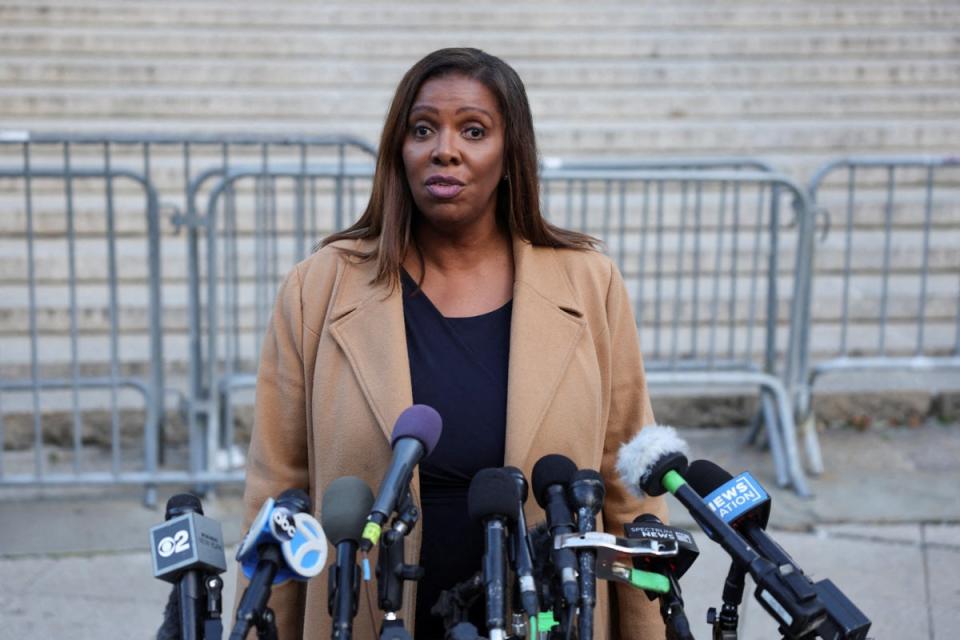
The lawsuit initially sought to recover $250m in so-called “ill-gotten gains” that otherwise would not have been achieved through accurate statements of financial condition – that is the documents that Ms James said lay at the centre of the case. Those documents were presented to banks and lenders as “exaggerated, grossly inflated, objectively false, and therefore fraudulent, and illegal,” she said at the time.
At the trial’s conclusion, her office increased the penalty value being sought to $370m. She also called on the court to bar the former president from New York real estate for the rest of his life.
A damning pretrial judgment
One year later, on 26 September 2023, Judge Engoron issued a pretrial judgment that resolved key claims in the lawsuit and drew a furious rebuke from the former president.
The judge determined that the allegations amounted to fraud, called on an independent monitor to manage Mr Trump’s operations and liabilities, and ordered several of his business licences to be rescinded, effectively upending his ability to run his business empire.
The decision arrived days before the start of the trial, and effectively prevented defendants from re-litigating already-determined elements of the case. The more-narrow trial, then, would focus on Ms James’s other claims and the amount, if anything, that the defendants would owe.
Mr Trump’s legal team successfully blocked the proposed sanctions from going forward as he appealed the judgment against him and his co-defendants.
But Judge Engoron’s ruling eviscerated what he called his attorneys’ “fantasy world” legal arguments which wasted the court’s time with “repetitive, frivolous” filings in an effort to delay the proceedings.
He also branded some of Mr Trump’s sworn statements in his depositions “wholly without basis in law or fact”.
Gag orders
When the trial got under way, Mr Trump flew in from Florida to be there in person.
Throughout the trial – as he dipped in and out of courtroom appearances – he routinely relied on the hallway outside the courtroom to hold impromptu press conferences to the rows of cameras capturing his coming and going from the court’s massive doorway. He would attack rivals and the cases against him to cast himself as a victim of political persecution – baseless claims that he echoes in campaign messages to raise millions of dollars for his legal defence.
On the trial’s second day, a post on Mr Trump’s Truth Social account falsely accused court clerk Alison Greenfield of being Senate Majority Leader Chuck Schumer’s “girlfriend”, posted a link to her Instagram account, then raged against her outside the courtroom.
The judge later told the court, without naming Mr Trump, that he ordered a “disparaging, untrue and personally-identifying post about a member of my staff” to be deleted.
“Personal attacks on members of my court staff are unacceptable, inappropriate and I will not tolerate them under any circumstances,” he said. “Consider this statement a gag order from posting, emailing or speaking publicly about any members of my staff.”
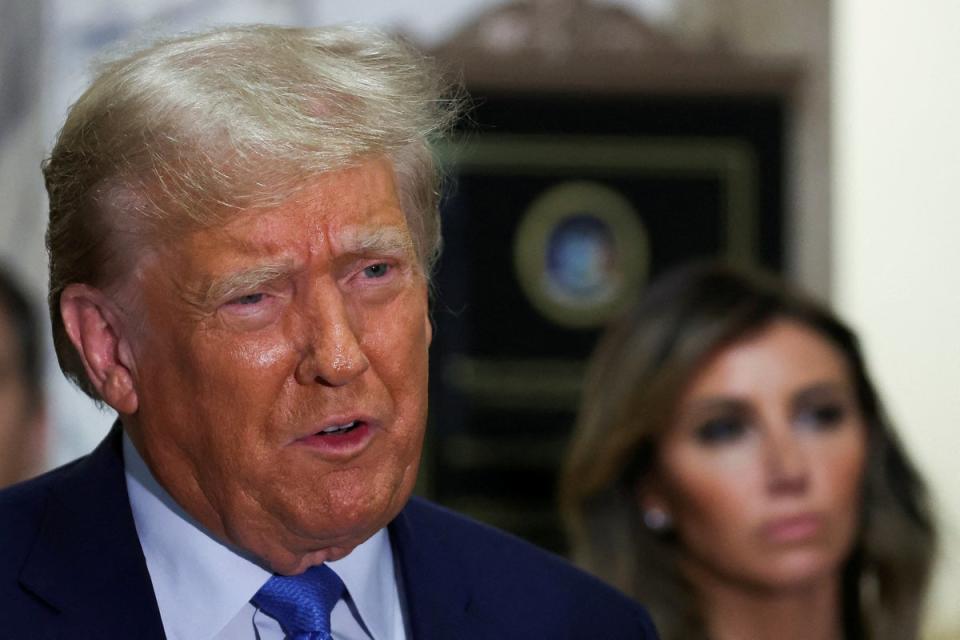
Mr Trump was later fined $5,000 for violating the gag order after a version of the post was discovered on a Trump website.
That same month, after testimony from his former attorney Michael Cohen, Mr Trump fumed against “a person who’s very partisan sitting alongside of him”. The judge determined this was another comment aimed at his chief clerk.
Mr Trump was called to testify about his remark – the first time he would appear on the witness stand – and claimed that he was talking about Cohen. The judge said his testimony was “not credible” and fined him $10,000, his second fine for violating the gag order.
“Don’t do it again or it will be worse,” the judge said.
In November, after Mr Trump’s attorney Christopher Kise launched into a tirade about what he called Ms Greenfield’s “bias” and what he feels like are “two adversaries” on the bench, the judge issued another gag order to encompass all parties, including attorneys, from disparaging court staff.
State appellate court judges upheld the gag orders after challenges from Mr Trump, and his attorney Alina Habba wrote a check to the court for $15,000 to cover his fines.
Trump takes the stand
In the trial’s sixth week, state attorneys called the former president to the witness stand. It didn’t take long for Judge Engoron to order Mr Trump’s attorneys to “control” him for his evasive and meandering answers.
Within the first hour of his testimony, an increasingly frustrated Judge Engoron and state attorneys tried to get him to answer questions about his net worth and assets without launching into speeches.
His answers were not only “nonresponsive, they’re repetitive”, said Judge Engoron, who warned that the former president’s ongoing rants could be negatively used against him.
Over the next several hours, he accused Ms James of trying to “demean” and “hurt” him politically, slammed her as a “political hack”, called the case a “disgrace” and told a lawyer with Ms James’s office that he should be “ashamed” of himself.
Waving his hands as he fumed on the witness stand, he turned his complaints towards the judge.
“You ruled against me and you said I was a fraud,” said Mr Trump, looking towards the floor in front of him. “He called me a fraud, and he didn’t know anything about me.”
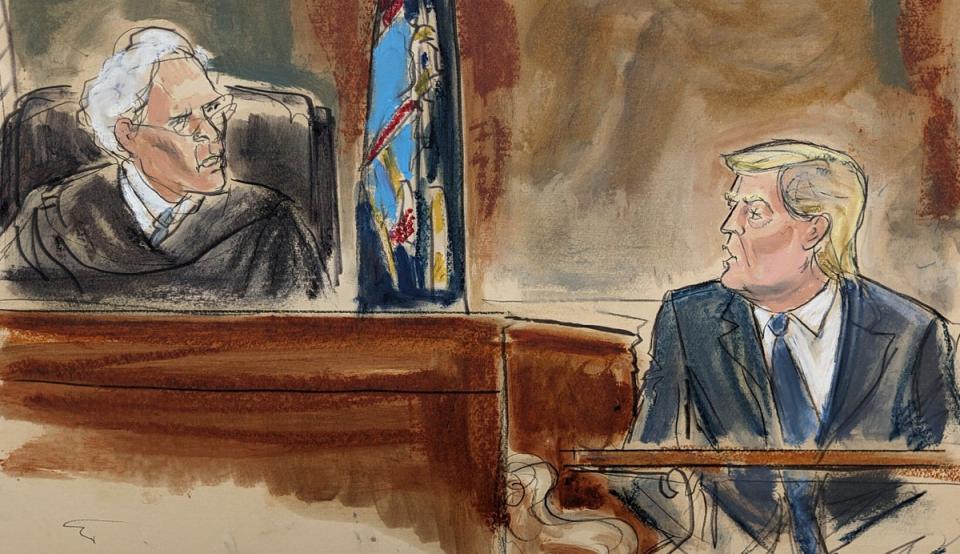
Mr Trump’s statements of financial condition “were just something you would have for yourself if you were borrowing money,” he testified.
“They were not really documents that the banks paid much attention to,” he added. “They just weren’t a very important element in the bank’s decision-making process. And we’ll explain that as the trial goes along. Crazy trial, as it goes along.”
He claimed that those statements are “the opposite” of the attorney general’s case, and much larger than reported, with his allegedly inflated values for his properties omitting an unreported “brand value”.
“I became president because of my brand value. I sell books at levels that are incredible,” he said.
He described the attorney general’s case against him as Mr Trump “wrote up phony things and defrauded banks”.
“There was no victim, and then you say, ‘you defrauded them,’” he added.
Judge Engoron interrupted him to address his attorneys: “Can you control your client? This is not a political realm.”
“I’ve asked several times to answer the question. I don’t think we want editorialising. We’ll be here forever and will accomplish nothing,” he added.
“You’re in control of the courtroom. Not me,” Mr Trump’s attorney Christopher Kise replied.
At another point, Judge Engoron told Mr Kise: “I beseech you, to control him. If you can’t, I will.”
“This is a situation where you have on the stand a candidate for president of the United States … and so the most efficient way I would ask the court is to listen to what he has to say and you weigh it,” Mr Kise replied. “The court needs to hear what he has to say about these statements and why they’re reliable.”
The judge fired back: “These people are not here to hear what he has to say. He is here to answer questions. … Sit down, already.”
“This is a very unfair trial,” Mr Trump said while sitting on the witness stand. “And I hope the public is watching.”
Michael Cohen’s testimony
When the former president’s former attorney took the stand, he testified that he was “tasked by Mr Trump to increase the total assets based upon a number that he arbitrarily elected” for his statement of financial condition.
Cohen and convicted former Trump Organization chief financial officer Allen Weisselberg were instructed to “reverse engineer the various different asset classes – increase those assets – in order to achieve the number that Mr Trump had tasked us with,” Cohen said.
Asked by counsel for the attorney general’s office what that number was, Cohen replied: “Whatever number Mr Trump told us to.”
Cohen, speaking deliberately and slowly under questioning from the attorney general’s office, told the court that he conducted the former president’s business “at the direction of, in concert with and for the benefit of Mr Trump”.
Ms Habba, pacing the courtroom as she volleyed questions to Cohen, showed him a series of glowing statements he gave to the press about his former boss from the years he was an employee of the Trump Organization.
Under questioning from his attorneys, Cohen agreed that his former boss never asked him to “inflate” the figures at the centre of the case, but that his commands were implicit rather than explicit.
“Donald Trump speaks like a mob boss,” Cohen said. “He tells you what he wants without specifically telling you … That’s what I was referring to.”
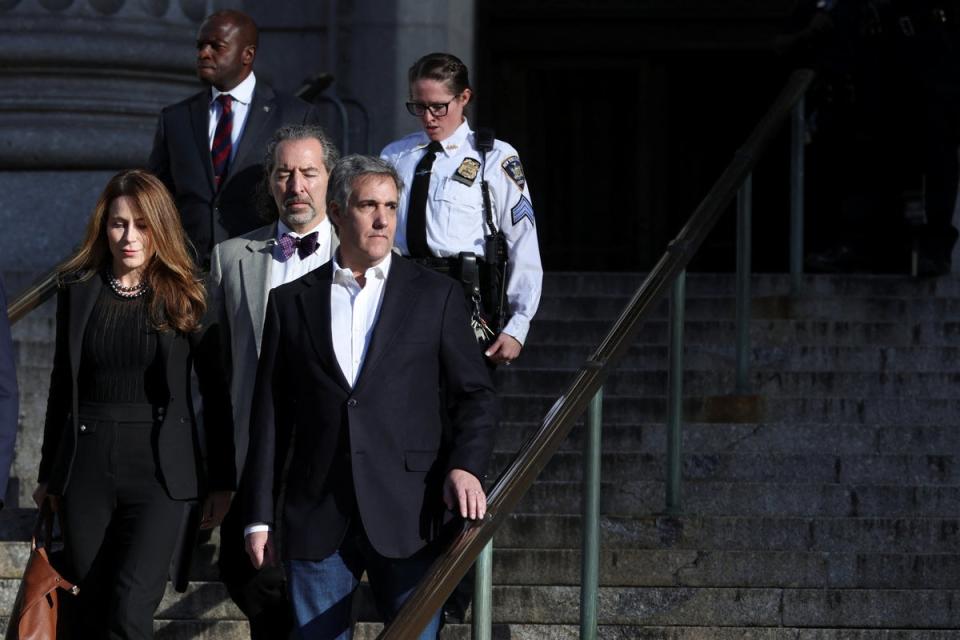
Mr Trump and his attorneys went on to insist that Cohen – who they labelled a “star witness” for the prosecution – is unreliable, didn’t implicate his former boss, and committed perjury on the stand, which they argue should be grounds to toss the case completely.
They argued that Cohen’s credibility blew the attorney general’s case apart, an argument that the judge vehemently rejected. In her questioning, Ms Habba appeared to suggest that Cohen tried to leverage his relationship to Mr Trump to avoid harsher criminal penalties in his own criminal cases, and then “cashed in” on his fallout with his former boss, who is at the centre of Cohen’s books, podcasts and other media.
After Judge Engoron denied an attempt from Mr Trump’s attorneys to render a verdict in his favour, the former president tossed his hands in frustration and left the courtroom.
“The witness just admitted that we won the trial,” he told reporters steps from the courtroom’s doors. “And the judge should end this trial immediately.”
Donald Jr, Eric and Ivanka testify
The three oldest Trump children – Donald Trump Jr, Eric Trump and Ivanka Trump – each carried similar titles and roles within the family company and oversaw some of their father’s brand-building developments. They each took the stand to give testimony at the trial.
Throughout their testimonies, Mr Trump’s adult sons distanced themselves from the creation of statements of financial condition, while state attorneys showed them emails and documents bearing their signatures to sign off on financial statements while they were effectively running the family business.
Donald Jr repeatedly stated that he didn’t recall conversations about those financial statements, what they included, or what he intended with them.
His brother Eric, who ran the day-to-day business while his father was in office, also testified that he didn’t have anything to do with those statements.
But state attorneys repeatedly confronted them with documents and emails that appeared to show that they were more aware of what went into those statements than they had previously stated.
Fuming on the stand at one point, Eric Trump said “we’re a major organization, a massive real estate organization. … I am fairly certain that we would have had financial statements”.
He sought to distinguish between discussions about finances and preparation for statements of financial condition.
“I don’t think it ever registered that it was for a personal statement of financial condition,” he said about one piece of correspondence with a former Trump Organization executive.
“It was a detail that was irrelevant to me.”
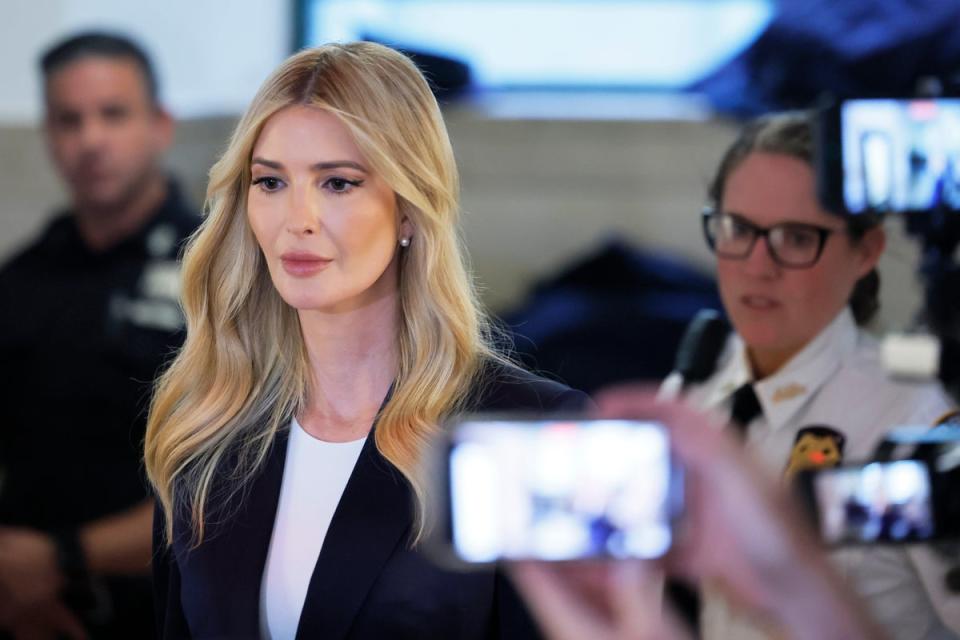
He was also shown emails he received from other Trump figures, including one from Weisselberg, explicitly referencing “your dad’s annual financial statement” or “Mr Trump’s annual financial statement,” with attachments to spreadsheets and footnotes that included the data used in those statements.
In her testimony, Ivanka Trump – who was dropped from the lawsuit last year and is no longer a defendant in the case – said she did not “recall” key documents about the family’s brand-building property deals, some of which the attorney general said she “captained”.
Similar to her brothers, Ms Trump denied any involvement with her father’s financial statements and other developments despite her apparent integral role in the Trump Organization’s real estate projects.
Death threats flood the court
Mr Trump’s volatile campaign, inflammatory statements and bully pulpit used to antagonise his rivals and fuel attacks against them all converged in a stunning affidavit that outlined the wave of threats facing the New York court in the weeks after the trial began.
Judge Engoron and his chief clerk received “hundreds of threats, disparaging and harassing comments and antisemitic messages” that followed the former president’s harassment, according to a court official submitting evidence to support the gag orders.
Transcriptions of threatening voicemails after Mr Trump first targeted Judge Engoron’s chief clerk fill more than 275 single-spaced pages.
The threats against them are “serious and credible and not hypothetical or speculative,” and “the implementation of the limited gag orders resulted in a decrease in the number of threats, harassment, and disparaging messages that the judge and his staff received,” according to the filing.
“However, when Mr Trump violated the gag orders, the number of threatening, harassing and disparaging messages increased,” the official wrote.
The morning before closing arguments, after Mr Trump’s lawyers refused to commit their client to limiting his outbursts in court, law enforcement investigated a “swatting” incident at the judge’s home.
Trump speaks out in the courtroom
Donald Trump wanted to deliver closing arguments in his case, but in a series of emails to attorneys before closing arguments in January, Judge Engoron stressed that he could not use his proposed time to deliver a campaign speech. That appeared to be a deal breaker for his attorneys.
Mr Kise, however, made a last-ditch effort in the courtroom to ask the judge, again, if Mr Trump could speak.
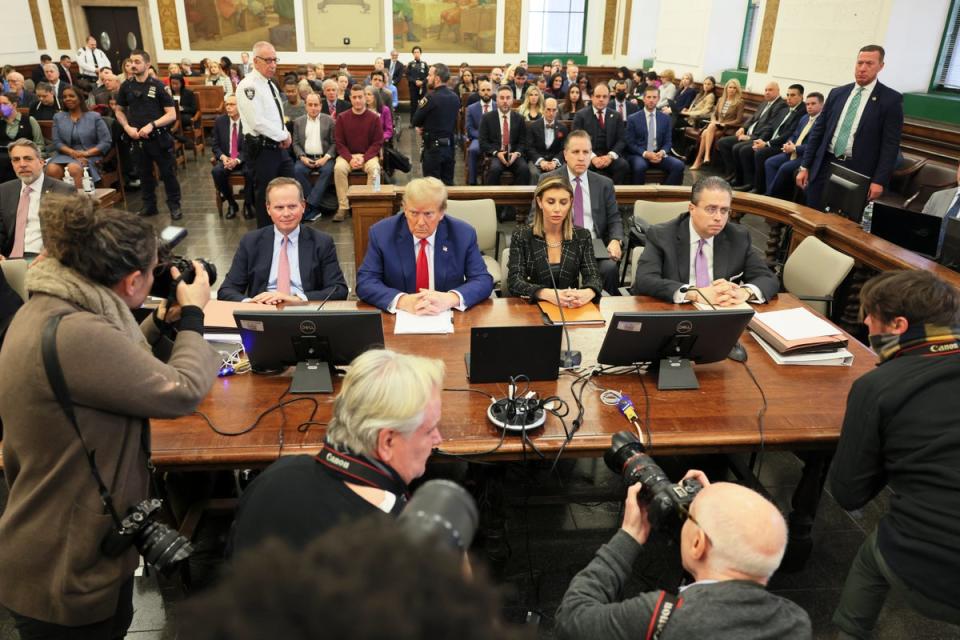
Before the former president answered whether he would abide by the rules, he launched into a breathless tirade from the defence table, seizing a few minutes to unload his familiar grievances while painting himself as the victim of political persecution who should be owed money for the litigation against him.
“We should receive damages for what we’ve gone through,” he said. “What happened here, sir, is a fraud on me.”
After the judge reminded him of the limited time on his clock, Mr Trump fired back: “You can’t listen for more than one minute.”
Judge Engoron asked Mr Kise to keep control of his client, with a warning that his time was limited.
“This could’ve gone a lot differently,” the judge said.
Trump ordered to pay more than $350m
On 16 February, Judge Engoron handed down his final ruling in the fraud case, ordering Mr Trump, his companies, his adult sons and their chief associates in his sprawling real-estate empire to pay more than $364m.
The former president also is barred from from holding any executive office with a New York company and from getting loans from New York banks for three years.
His sons Donald Trump Jr and Eric Trump are also barred from executive offices with any New York company for two years.
Former executives Allen Weisselberg and Jeffrey McConney are also permanently barred from financially controlling any New York businesses , and face a three-year ban from serving as an officer or director of any New York business.
Oliver O’Connell contributed reporting

